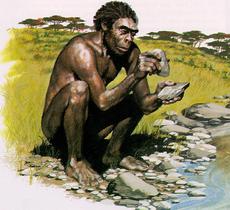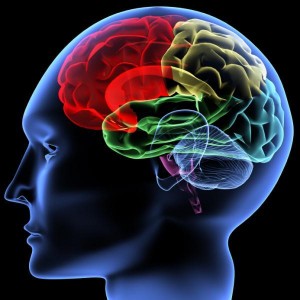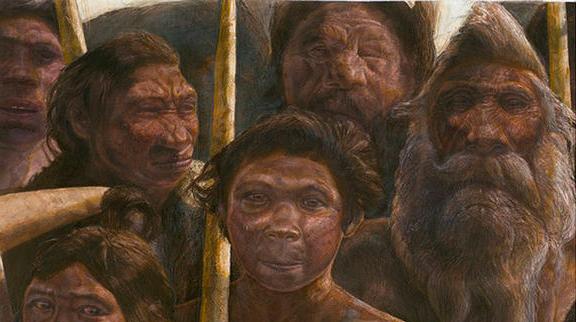The basic contradiction of man is this: ‘higher thought’ (that is, symbolic or conscious thought) is inherently separative, whereas nature and the universe operate from the principle of seamless wholeness. Has that contradiction come to a head?
 Symbolic thought is essentially an adaptation par excellence that allows humans to remove ‘things’ from the environment, and manipulate them in a countless number of ways.
Symbolic thought is essentially an adaptation par excellence that allows humans to remove ‘things’ from the environment, and manipulate them in a countless number of ways.
Control of the environment through science and technology has increased exponentially, and scientists are now talking about even more ruthless and destructive methods of control, literally merging the brain with the machines the human mind has invented. But becoming one with our computers and robots is a psychologically incestuous path for the individual and humankind.
Narcissism, power, domination, and mass manipulation are out of control, and corporate globalization threatens the viability of life on earth. Radical change in the human psyche is the only recourse as far as I can see. Signs point toward it not happening at this time, and many misanthropically wish for catastrophe, even apocalypse. Despite or because of that, is this the darkest hour before the dawn of a new species, worthy of the name Homo sapiens?
The hominid brain gradually became more and more capable of removing things, generating symbols, storing information, and communicating increasing knowledge to succeeding generations. At some point, perhaps with the evolution of modern humans some 100,000 years ago, a breakthrough in cognition occurred, and consciousness as we know it emerged.
The problem with ‘higher thought’ has always been its tendency to mistake its separations for actuality, and to psychologically separate—that is, divide. That was OK as long as humans lived close to nature, and had a lot of room for error. But now we’ve run out of space, outwardly and inwardly, and the only way out is by going within.
From an evolutionary perspective, how did we get into this mess? Apparently, without a deep and abiding insight into the mind’s nature, symbolic thought inevitably produces more and more division and fragmentation, until an implacable ecological and psychological crisis ensues.
It’s probably happened elsewhere in the universe, which makes the idea of ‘franchising humanity’ to other planets a bad joke. On the other hand, a deep change in our attitude toward symbolic thought changes one’s emotional perception of our place in nature and the universe. If a sufficient number of humans brought about such a change within themselves, we would stop destroying our planet and ourselves, and join the ranks of intelligent species.
With the juggernaut of globalization, there is no way back to a more balanced time, despite the sad fad of localism. The few remaining pockets of local control cannot be preserved and protected from the juggernaut. The only way ahead is transmutation, which is being driven by the self-made crisis of consciousness.
Scientists say that the human brain is the most complex system that nature has devised on this planet. Philosophers say that ours is a problem solving brain. Certainly thought conceives and creates problems, and then more or less solves them. Even pure science can be viewed as problem solving — posing questions about phenomena in order to solve how things work in nature.
But is this all the human brain is, a problem solving mechanism? What about the problem that the problem solving mind poses to the planet and itself? Humankind is presently decimating species at a rate comparable to the great extinctions caused by asteroids. How and why could evolution make such a mistake?
great extinctions caused by asteroids. How and why could evolution make such a mistake?
Like the Sorcerer’s apprentice, symbolic thought cannot stop separating, dividing and fragmenting as long as it is primary. That’s why many ancient traditions sought to quiet the mind. The plethora of meditation practices and techniques nowadays seek to bring about a stillness of the mind, and with it wholeness and peace. But since all techniques and methods are themselves the product of thought, as are beliefs and religions, it isn’t happening.
So is the human brain merely the consciousness that symbolic thought produces? Or does it have another capacity altogether?
The brain has a tremendous capacity for awareness, with which, paradoxically, the evolution of ‘higher thought’ endowed us! That’s called ‘exaptation,’ and it means that an adaptation evolved for one purpose carries with it the potential for another purpose altogether. The most common example is feathers, which evolved for warmth, but became instrumental for flight. For us, exaptation means the awareness of a separate self carries with it the potential for holistic and healing self-knowing.
A threshold of consciousness was crossed, many paleo-anthropologists believe, with the progenitors in Africa of Cro Magnons more than 100,000 years ago, which allowed diverse cultures, art, and probably fully articulated language to emerge. Given that symbolic thought has an inherent tendency toward division and fragmentation, and that the present global ecological, spiritual, economic, political and cultural crisis is the extreme expression of that tendency, then only a conscious breakthrough into another kind of consciousness altogether can liberate us.
Humans are creatures of words and images, and mediate experience through symbols. In the meditative state however, words fall silent and symbols fall away. In complete awareness, the brain is simply still and awake, and thought assumes its rightful place.
That is to say, when the brain becomes deeply aware of and attentive to the movement of thought, undivided observation acts on thought, halting it. The entire cognitive apparatus in the brain falls silent, and remembering, associating and even recognizing cease. One sees anew, and there is a restoration of innocence in the ‘immaculate perception,’ which is deeply regenerative to the brain and body.
Insight affects the brain–not just the software, but the hardware as well. Therefore a deepening insight into the nature of thought, through self-knowing, is indispensable to the resolution of the crisis of consciousness. Taking time daily to simply observe the movement of the mind transforms thought-consciousness, and opens the door for the individual and humankind into another order of consciousness altogether.
Martin LeFevre

